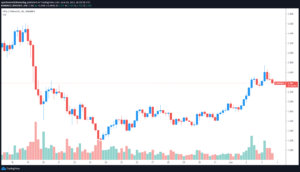
15 years ago, the social media application Twitter was launched. You might have heard of it, it’s pretty big. Initially, the microblogging and social networking service was a friendly place, packed full of helpful articles and adorable videos. In a recent article, aptly pealkirjaga ‘How Twitter ruined everything,’ the author Douglas Murray wrote, somewhat nostalgically, “It all started out so well.” Jack Dorsey’s brainchild was once, believe it or not, fun. People used the platform to say wacky things, but fun wacky, not QAnon wacky. Oh, how times have changed.
Twitter on paljuski muutunud taevast kohast täiesti põrguliseks: kunagisest Eedeni keskkonnast on saanud düstoopiline õudusunenägu. Kassivideod on asendatud kavalate kommentaaridega, üha rohkem inimesi kasutab platvormi tweetstormide vallandamiseks - teadvuse voog 280 tähemärgiga või vähem.
Jackson Palmer, the co-creator of Dogecoin (DOGE), is the latest to use Twitter for such purposes. In a tweetstorm of epic proportions, Palmer managed to capture the attention of both crypto-enthusiasts and critics, kutsudes cryptocurrencies “an inherently right-wing, hyper-capitalistic technology.” The whole industry, according to the inventor, is an exploitative hustle, capitalizing on the naivety of the less well off. According to Palmer:
Krüptorahatööstus kasutab varjuliste äriühenduste, ostetud mõjutajate ja mängu eest tasuliste meediaväljaannete võrku, et säilitada kultusetaoline "kiiresti rikkaks saamise" lehter, mille eesmärk on rahaliselt meeleheitlikest ja naiivsetest uut raha ammutada.
- Jackson Palmer (@ummjackson) Juuli 14, 2021
News flash, Mr. Palmer: You just described the world we live in. The world’s 2,000 billionaires omama more wealth than almost 5 billion people combined. This is one of the very reasons why Bitcoin (BTC) was launched in the first place. The world is rigged in a way that allows the super-rich to kasum while the world põletus. This might sound hyperbolic, but I assure you it’s not.
In this inherently korrumpeerunud world, decent cryptocurrencies — like Ether (ETH) and Bitcoin, for example — do offer the non-billionaires, all 7.8 billion of us, some degree of hope. As the barriers to entry are virtually non-existent, with basic knowledge, a willingness to educate oneself on the topic and a reasonably small amount of money, one can make decent profits from decent cryptocurrencies. Of course, like everything in life, there is always a degree of risk involved; caution must always be exercised. But to write off the whole crypto-market, as Palmer did, makes little sense. If in doubt, just ask the president of El Salvador.
Seotud: Mis on tegelikult El Salvadori "Bitcoini seaduse" taga? Eksperdid vastavad
Krüpto annab hääletutele hääle
When we discuss “exploitative” actors, it is important to discuss traditional banking services — possibly the most exploitative of them all. With financial intermediaries like Western Union charging exorbitant handling charges, migrants kaotama almost $25 billion each year through remittance fees. Why can’t a decent cryptocurrency (or cryptocurrencies) offer people a less exploitative alternative? An alternative, after all, is most definitely needed.
Vastavalt to a recent United Nations report, around 11% of all people globally “are supported by funds sent home by migrant workers.” As the report explains:
"Praegu on maailmas umbes üks miljard inimest või üks seitsmest seotud rahaülekannetega, kas nende saatmise või vastuvõtmisega. Umbes 800 miljonit inimest maailmas - ehk iga üheksas inimene - saavad neid rahavooge, mille on saatnud nende töö tõttu rännanud pereliikmed. "
Teisisõnu, umbes 800 miljonit inimest kogu maailmas saavad kasu alternatiivist Western Unionile, kõike kuluvale rahaülekande goliathile.
Jällegi, miks mitte krüpto? Nagu raportis öeldakse, on „saadud raha võtmetähtsusega miljonite vaesusest vabanemisel“, kuna „see on sageli suur osa leibkonna päritoluriikide leibkonna kogutulust ja kujutab endast sellisena päästerõngast miljonitele peredele. ” Kujutage ette, kui palju tugevam oleks see päästerõngas, kui 25 miljardi dollari rahaülekandetasud läheksid pigem toidu ja peavarju, mitte ekspluateerijate taskusse.
This is not a fantasy projection. The current system is very much broken, and a change is very much needed. According to the Pew Research Center, the wealth gap between America’s richest and poorest families has more than kahekordistunud in size since 1989, and that gap is only kasvav. While Amazon employees roojama in bags, their once billionaire boss, Jeff Bezos, haarab in a pissing contest with Richard Branson….in space. The landscape must be transformed.
Kas krüptorahad võivad aidata? Jah. Kuidas nii? Andes hääle hääletutele; andes kõige haavatavamatele suurema rahalise autonoomia. Kõiki krüptovaluutasid ei looda võrdselt. Iga Bitcoini või Eetri kohta on mõttetu koerteemaline meemimünt; Palmeril oleks hea seda enne kogu krüptoturu maha kirjutamist meeles pidada.
See artikkel ei sisalda investeerimisnõuandeid ega soovitusi. Iga investeerimis- ja kauplemisliikumine on seotud riskiga ning lugejad peaksid otsuse langetamisel ise uurima.
Siin avaldatud vaated, mõtted ja arvamused on autori ainuisikulised ega kajasta tingimata Cointelegraphi seisukohti ja arvamusi.
John Mac Ghlionn on teadlane ja kultuurikommentaator. Tema teose on avaldanud sellised ajakirjad nagu Bitcoin Magazine, The New York Post, The Sydney Morning Herald ja National Review.
Source: https://cointelegraph.com/news/no-jackson-palmer-you-are-wrong-about-crypto
- "
- 000
- 7
- nõuanne
- Materjal: BPA ja flataatide vaba plastik
- Amazon
- Ameerika
- taotlus
- ümber
- artikkel
- kaubad
- kotid
- Pangandus
- tõkked
- bezos
- Miljard
- miljardärideks
- Bitcoin
- Bitcoin ajakiri
- piiritu
- äri
- muutma
- koormuste
- laadimise
- CNN
- Mündid
- Cointelegraph
- kommentaarid
- Side
- Teadvus
- konkurss
- riikides
- krüpto
- cryptocurrencies
- cryptocurrency
- Krüptovaluutade tööstus
- Praegune
- DID
- Dogecoin
- töötajad
- keskkond
- Eeter
- ekspertide
- peredele
- pere
- Tasud
- finants-
- esimene
- välklamp
- toit
- täis
- lõbu
- raha
- lõhe
- andmine
- Käsitsemine
- siin
- Avaleht
- Kuidas
- HTTPS
- tulu
- tööstus
- mõjutajad
- investeering
- seotud
- IT
- jeff bezos
- Võti
- teadmised
- hiljemalt
- mac
- peamine
- Tegemine
- Meedia
- liikmed
- Meem
- miljon
- raha
- liikuma
- võrk
- võrgustike loomine
- New York
- pakkuma
- Arvamused
- Muu
- Inimesed
- inimesele
- Vaesus
- president
- lugejad
- põhjustel
- Rahaülekanne
- rahaülekanded
- aru
- teadustöö
- Reuters
- läbi
- Richard Branson
- Oht
- tunne
- Teenused
- Varjupaik
- SUURUS
- väike
- So
- sotsiaalmeedia
- Sotsiaalse meedia
- sotsiaalsete võrgustike
- Ruum
- alustatud
- Ühendriigid
- Toetatud
- sydney
- süsteem
- Tehnoloogia
- Maastik
- Kauplemine
- traditsiooniline pangandus
- puperdama
- UN
- liit
- Ühendatud
- Ühendrahvad
- us
- Videod
- Hääl
- Haavatav
- Jõukus
- WHO
- sõnad
- Töö
- töötajate
- maailm
- kirjutamine
- aasta
- aastat












